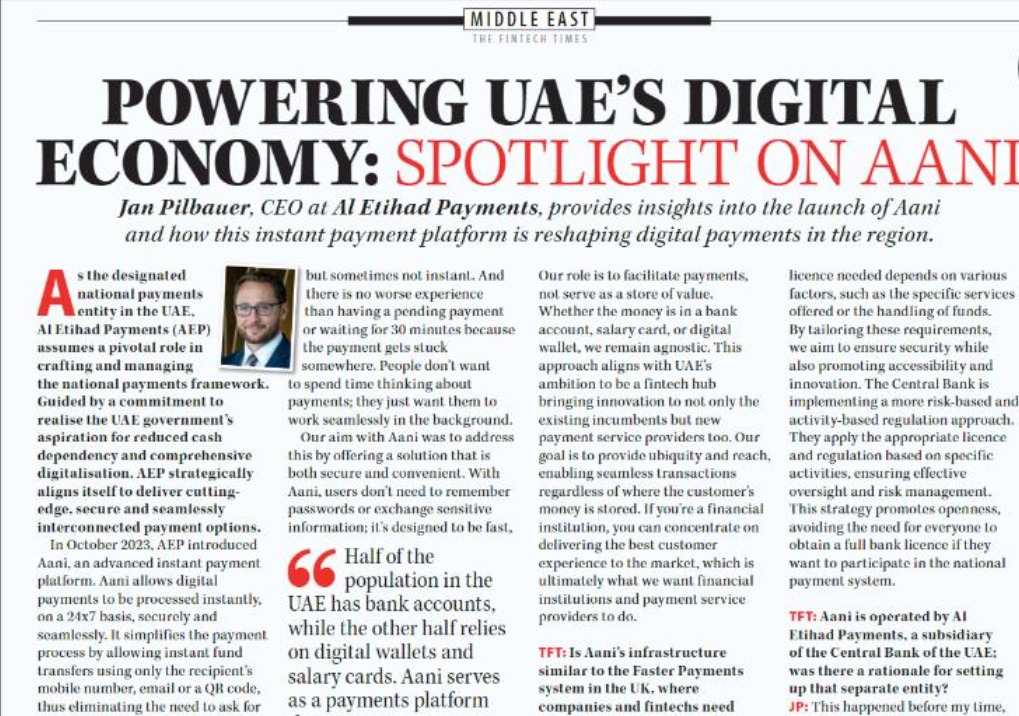
12 March 2024
As the designated national payments entity in the UAE, Al Etihad Payments (AEP) assumes a pivotal role in crafting and managing the national payments framework. Guided by a commitment to realise the UAE government's aspiration for reduced cash dependency and comprehensive digitalisation, AEP strategically aligns itself to deliver cutting-edge, secure and seamlessly interconnected payment options.
In October 2023, AEP introduced Aani, an advanced instant payment platform. Aani allows digital payments to be processed instantly, on a 24x7 basis, securely and seamlessly. It simplifies the payment process by allowing instant fund transfers using only the recipient's mobile number, email or a QR code, thus eliminating the need to ask for or remember complex IBANs.
With Aani’s QR code capability, thousands of UAE’s businesses can accept payments, either by printing a QR code or generating a dynamic QR on a smartphone or in their online store. Mark Walker, editorial director at The Fintech Times, chats to Jan Pilbauer, CEO at Al Etihad Payments, to learn more about the need for inclusivity, security and frictionless payments.
Q: What prompted the development of Aani as a new instant payment platform?
A: The UAE has always been good at advancing different payment methods, but the development of Aani is something truly exciting and innovative that we have brought to the market. Some countries around the world have already implemented instant payment solutions, such as the UK's Faster Payments introduced in 2008, or initiatives in South Africa dating back to 2006. However, many solutions often fell short of meeting user expectations. Instant payments of the past were sometimes instant but sometimes not instant. And there is no worse experience than having a pending payment or waiting for 30 minutes because the payment gets stuck somewhere. People don't want to spend time thinking about payments; they just want them to work seamlessly in the background.
Our aim with Aani was to address this by offering a solution that is both secure and convenient. With Aani, users don't need to remember passwords or exchange sensitive information; it's designed to be fast, reliable, and hassle-free. Another significant factor we considered was inclusiveness. Half of the population in the UAE has bank accounts, while the other half relies on digital wallets and salary cards. Aani serves as a payments platform that caters to everyone, allowing users to connect their wallet, salary card, or traditional bank accounts. So, the main drivers behind Aani were really security, convenience, speed, and inclusiveness.
Q: Does Aani encourage more participation in the payment system?
As a utility, we simplify processes for financial institutions, handling secure transactions, settlement, and risk management. Our role is to facilitate payments, not serve as a store of value. Whether the money is in a bank account, salary card, or digital wallet, we remain agnostic. This approach aligns with UAE's ambition to be a fintech hub bringing innovation to not only the existing incumbents but new payment service providers too. Our goal is to provide ubiquity and reach, enabling seamless transactions regardless of where the customer’s money is stored. If you're a financial institution, you can concentrate on delivering the best customer experience to the market, which is ultimately what we want financial institutions and payment service providers to do.
Is Aani's infrastructure similar to the Faster Payments system in the UK, where companies and fintechs need to be registered legal entities with appropriate regulation in place before participating?
Faster Payments in the UK paved the way for instant payment systems. However, there's been a notable evolution since then. Faster Payments initially relied on ISO 8583, an older card standard, which is now considered outdated. Aani's instant payment solutions have moved beyond this, adopting API-based technology and ISO 20022. This shift is revolutionary as it makes it much easier for developers to connect to our payment system.
Now, while both systems prioritise security, there are some differences in regulatory requirements. To participate in Aani, entities must obtain a licence from the Central Bank of the UAE. The type of licence needed depends on various factors, such as the specific services offered or the handling of funds. By tailoring these requirements, we aim to ensure security while also promoting accessibility and innovation. The Central Bank is implementing a more risk-based and activity-based regulation approach. They apply the appropriate licence and regulation based on specific activities, ensuring effective oversight and risk management. This strategy promotes openness, avoiding the need for everyone to obtain a full bank licence if they want to participate in the national payment system.
Aani is operated by Al Etihad Payments, a subsidiary of the Central Bank of the UAE Was there a rationale for setting up that separate entity?
This happened before my time, so I cannot comment specifically about the motivations of the Central Bank of the UAE. Generally, there are two main reasons behind the establishment of a separate payments entity by any central bank. Firstly, as regulators, they find it more convenient to delegate the operations of retail payment systems to a distinct legal entity. This allows them to oversee and regulate these payments systems without directly operating them, avoiding any potential or perceived conflicts of interest. Secondly, unlike some “for-profit” national payments companies seen elsewhere, AEP operates as a utility, focusing on public service rather than profit maximisation. Lastly, you also need a bit of a different governance approach to operating national payments schemes, one that encourages market input and collaboration. By hosting forums with financial institutions, AEP can gather feedback on how to evolve and improve its services. This approach, common worldwide, simplifies operations and enhances effectiveness.